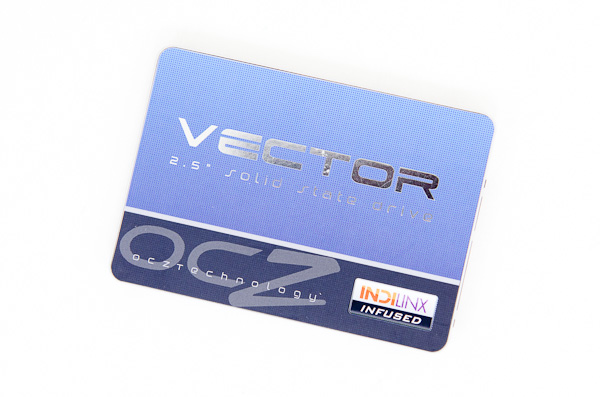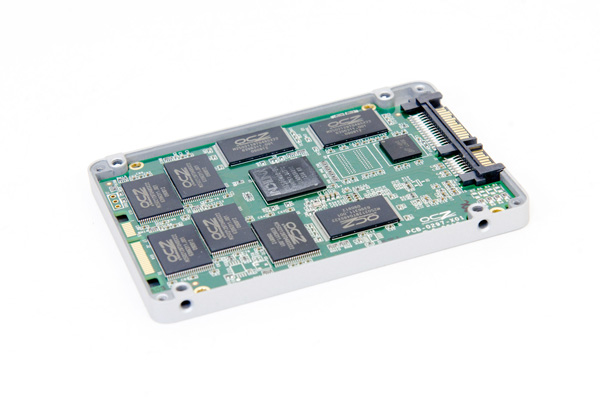OCZ Vector (256GB) Review
by Anand Lal Shimpi on November 27, 2012 9:10 PM ESTFinal Words
With the Vector, OCZ has built a price and performance competitor to Samsung's SSD 840 Pro, which previously remained peerless at the top of our charts. For a company that just weeks ago was considered down and out for the count, this is beyond impressive. Samsung has emerged as one of the strongest players in the consumer SSD space, and OCZ appears ready to challenge it. In our tests, Samsung typically enjoys better peak performance, but OCZ's Vector appears to have the advantage when it comes to worst case performance and IO consistency. The latter tend to be more valuable in improving overall user experience in my opinion. I would still like to see an S3700-class client drive and I'd be willing to give up top-end performance to get there, but I suspect that's a tall order for now.
The Vector's power consumption under load, given the performance it's able to deliver, is excellent. I wish idle power consumption were better, making the 830/840 Pro a better fit for ultra mobile applications. But under load the Vector and 840 Pro are indistinguishable from one another.
The only downside to the Vector really is its price, which like the 840 Pro is at a definite premium vs competition from the previous generation. As with all SSDs however, I fully expect Barefoot 3 and maybe even the Vector itself to fall in price over time. If you want the latest and greatest available today, Samsung's 840 Pro now has competition in OCZ's Vector.
The Barefoot 3 controller is quite promising. It certainly seems very capable from a performance standpoint without blowing through its power budget. It's no small feat if OCZ's best in-house silicon can be spoken of in the same sentence as Samsung's. The PLX and Indilinx acquisitions appear to have paid off. I'm curious to see how OCZ's improved validation and reliability testing fare in the long run. This isn't the first time that OCZ has promised to focus more on validation, but with Vector I do get the feeling that things are different. I didn't run into any compatibility issues or reliability problems with the Vector in my testing, but as always the proof is what happens when these drives make their way into the hands of end users.
Overall I'm impressed by the Vector. It's a huge improvement over the already good Vertex 4, and manages to compete in a different league by fixing some lingering performance issues with its predecessor. I had resigned myself to assuming no one would come close to Samsung on the high-end, but it's good to be proven wrong. Should OCZ be able to deliver Samsung-like performance and reliability, then I'll really be impressed.












151 Comments
View All Comments
extide - Wednesday, November 28, 2012 - link
Copy Performance is tied to the block size you use when reading and writing. IE if you read 4k at a time, then write 4k at a time, you will get different performance than reading 4MB at a time and then writing 4MB. So it largely depends on the specific app you are using. Copy isnt anything special, just reads and writes.mark53916 - Thursday, November 29, 2012 - link
Maybe I should have explained more:I have found that most USB keys and many SATA SSDs perform
MUCH worse (factor of 10 and even up to more than
300 decrease in performance) when reads and writes are mixed,
rather than being a bunch of reads followed by a bunch writes.
The reads and writes can be to random locations and there still
can be a big performance it.
A feel that a simple operating system copy of a large sequential
file and a tree of a bunch of smaller files should be done since
the two tests have shown me large performance differences
between two devices that have the about the same:
. sequential read rate
. sequential write rate
. Read/second
. Writes/second
when the reads and writes aren't mixed.
I also found that HD Tune Pro File Benchmark sometimes shows
significant (factor of 10 or more) differences between the
Sequential 4 KB random single and 4 KB random multi tests.
(For my own personal use, the best benchmark seems to be
copying a tree of my own data that has about 6GB in about
25000 files and copying from one 8GB TrueCrypt virtual disk
to another on the same device. I see differences of about
15 to one between stuff that I have tested in the last year
that all show speeds limited by my 7 year old motherboards
in sequential tests and all performing much slower with the
tree copy tests.
Since the tree is my ad-hoc data and my hardware is so old
I don't expect anyone to be able to duplicate the tests, but I
have given results in USENET groups that shows that there
are large performance differences that are not obviously
related to bottlenecks or slowness of my hardware.
There could be something complicated happening that
is due, for instance, in a problem with intermixing
read and write operations on USB 3 or SATA interface
that is dependent on the device under test but not
due to an inherent problem with the device under test,
but I think that the low performance for interleaved reads
and writes is at least 90% due to the device under test
and less than 10% due to problems with mixing
operations on my hardware since some devices don't
have a hit in performance when read and write operations
are mixed and have sequential uni-directional performance
much higher than 200MB/s on SATA and up to 134MB/s
on USB 3.
There could be some timing issues caused by having
a small number of buffers (much less than 1000), only
2 CPUs, having to wait for encryption, etc., but I don't
think these add up to a factor of 4, and, as I have said,
I see performance hits of much more than 15:1
for the same device, and all I did was switch from copying
from another flash device to the flash device under test
to copying from one location on the flash device under test
to another location. on the same device. Similarly, the
HD Tune Pro File Benchmark Sequential 4 KB random single
compared to 4 KB random multi with multi 4 or more
takes a hit of up to 100 for some USB 3 flash memory keys,
whereas other flash memory keys may run about the same speed
for random single and multi as well as about the same speed for
as the poorly performing device does for 4 KB random single.
MarchTheMonth - Wednesday, November 28, 2012 - link
Anand, I just want to know what you think of as a difference with the new CEO sending a formal, official compared to the hand-written notes by Ryan. To me (an outsider), official letters bore me, as they are just a carbon copy of the same letter sent to many others.A handwritten note would mean more to me. Now, given that the handwritten note was more of a nudge, I can understand that perhaps a less "nudging" note would be more appreciated, but I digress.
Just curious.
-March
BrightCandle - Wednesday, November 28, 2012 - link
Do you have more confidence this time that OCZ is actually being honest about the contents of their controller chip? Clearly last time you were concerned about OCZ's behaviour when you reviewed the Octane (both in terms of reviewing their drives and allowing them to advertise) and they out right lied to you about the contents of the chip, they lied to everyone until they got caught.This time do you think the leopard has changed its spots or is this just business as usual for a company that cheats so frequently?
gammaray - Wednesday, November 28, 2012 - link
The real question is,Why pay for an OCZ Vector when you can get a Samsung 840 Pro for the same price??
jwilliams4200 - Thursday, November 29, 2012 - link
Very good question.Hood6558 - Wednesday, November 28, 2012 - link
If these are priced to compete with Samsung's 840 Pro, only a die-hard OCZ fanboy would buy one, since the 840 Pro beats it in almost every benchmark, and is considered the most reliable brand, while OCZ has a long, rich history of failed drives, controllers, and firmware. Even if they were priced $50 below the Samsung I wouldn't buy one, at least not until they had 6 months under their belt without major issues. It get's old re-inventing your system every time your SSD has issues.SanX - Thursday, November 29, 2012 - link
Remember that excluding typed vs handwritten letter to Anand this is still 100% Ryan Petersen in each SSDskroh - Thursday, November 29, 2012 - link
I noticed that in the consistency testing, the Intel 330 seemed to outperform just about everything except the Intel 3700. That seems like a story worth exploring! Is the 330 a sleeper user-experience bargain?jwilliams4200 - Thursday, November 29, 2012 - link
For one thing, it did not look to me like the 330 had yet reached steady-state in the graphs provided. Maybe it had, but at the point where the graph cut-off things were still looking interesting.